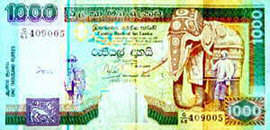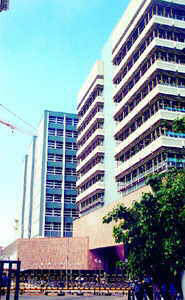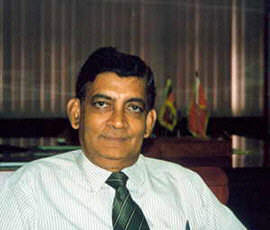 FINANCE: FINANCE:
MAINTAINING A HEALTHY GROWTH |
During the last few years the economy has gone through a number of reform programs: liberalization, a deregulation process, international trade and tariff policies have been substantially reformed, public enterprises have been restructured, the tax system has been modernised, and the private sector has been encouraged into infrastructure development activities. According to the Secretary of Finance, Mr. P.B. Jayasundera, 'the government has attempted to consolidate the macro economic situation through financial sector reforms, fiscal reforms and regulatory changes.

As a result, the economy has become much more resilient to various shocks and had maintained a healthy growth of over 5% during the last six to seven years.' He furthermore argues that 'the government has taken corrective measures by adopting price corrections and reconsolidating the macro economic situation, and consequently, the country has successfully entered into an IMF program to stabilize the current situation and to consolidate the growth process.'
The institution responsible for financial sector stability is the Central Bank of Sri Lanka, whose functions have been lately strengthened. For example the bank reduced its direct controls and encouraged market growth, often being closely involved in the development of new institutions and instruments. The objectives of the Central Bank in the future will focus more closely on maintaining domestic price stability of the financial sector, and monetary policy will be more active and increasingly implemented through market-based instruments.

The country is now in the process of embarking onto a second-generation reform program, where key sectors have to be restructured before moving onto other transactions. As a result, Sri Lanka is now in the stage of restructuring and re-engineering some of the key sectors such as power and electricity, petroleum, water and the Port. Large infrastructure for urban development is also being considered. Hence the next two to three years will be concentrated to consolidate an environment conducive for increased private sector participation.
Sri Lanka has gone through almost twenty years of creating an environment conducive for foreign investment, because the government has recognized that foreign investment is a part of the overall development strategy. The government has also given recognition to build infrastructure as early as possible to remove bottlenecks for private sector investment in a wide spectrum of activities. In fact compared with what it was years ago, many activities are now in the hands of the private sector. Economic activities have been further rationalized, for example the insurance and finance related activities have been liberalized. Earlier foreign investment in banking which were restricted to less than 50% now it has been opened up to 60%, which shows the BOI's concentration on the promotion of foreign private investment.
With the Indo-Lanka Free Trade Agreement entering into the second year, a lot of investment opportunities are being explored. Sri Lanka has emerged as a leading manufacturer for various up markets and is now moving into ancillary products in a bigger way. There are new investment avenues in the petroleum sector because the government is planning to liberalize petroleum imports. There are major investment opportunities in the power sector as well, and the government is inviting BOO / BOT projects into those areas. There is also wider scope for tourism with the new tourist development strategy, which is based on bio diversity as well as on its cultural heritage, art and crafts. These are combined products that are being explored for marketing purposes in place of the old marketing concept of beach resorts. So, there is diversification in the tourism sector as well. The environment and plantation sectors are beginning to attract new opportunities because of the environmental priorities in the country. Combined licenses are now being offered in place of separate licenses for mobile operations and fixed line operations, and many inquiries have been made with regard to infrastructure development as well.
Sri Lanka in the South Asian region is in a very advantageous position. Not only economically but it also it possesses the infrastructure advantage and the human resource aspect. Besides India through the Indo-Lanka trade agreement, Sri Lanka has entered into another big market through the trading arrangement with the EU giving duty free access to the textile industry of Sri Lanka. This has opened new opportunities to shift away from the quota market, with 40% of the garments moving into non-quota markets. Despite all the recent difficulties related to the ethnic conflict, the high fiscal imbalance and the very high budget deficit, the country has still been able to maintain a 5% growth. | A major player in the finance and insurance industry is Sri Lanka Insurance Corporation. The Government-owned Sri Lanka Insurance Corporation was formed in 1962 with the nationalization of all insurance companies in Sri Lanka. It is a limited liability company with a majority of the Directors having private sector experience. Until recently there were two insurance companies, which were owned by the government, one was privatised in May 2001 and the other one the Sri Lanka Insurance Corporation remained the only insurance company with a 100% government stake.

"During the last couple of years many new insurance companies have been formed in Sri Lanka. One has a significant foreign share holding while the others are local companies. Some are medium sized while the others are relatively small. All these companies are fiercely competing with us, but I am happy to say that we are able to maintain our leadership in the market share. In fact we have gained some market share this year," says its chairman, Mr. Lal de Mel.
The Corporation considers its social responsibility as a primary obligation, while ensuring that it doesn’t run at a loss. " We are now having negotiations with the government over the health scheme for the public service," says the chairman.
Sri Lanka Insurance Corporation believes in "womb to tomb" life insurance cover, by offering health insurance from the first breath, for the rest of life. Recently they also introduced an inflation adjusted comprehensive funeral expenses cover. 'We are now looking at a confinement insurance cover, to make "womb to tomb" cover a reality. In addition all our health policies and critical insurance policies are being reviewed, to offer in each case best value for money,' the chairman says. The company has also launched an insurance cover for migrant workers, since its prime objective is to fulfil its social responsibilities. "The problem that we have identified is that those who go to the Middle East countries as domestics find that some employers take their passports and sometimes do not pay their wages. As a result they are stranded. We have addressed this issue using the Web. Our policyholders are provided with a return air ticket in case of harassment. Because of our relationship with Sri Lankan Airlines, they will check the validity of the cover by accessing our web site srilankainsurance.com. The web site provides links to the Foreign Employment Bureau, the Immigration Department, and embassies, to email and get the necessary documents. The cover itself is quite extensive," Mr De Mel says.
"We have gone a step further through an arrangement with Bank of Ceylon, to provide the facility of opening a non-resident foreign currency account, free of charge. On receipt of a remittance of 400 Dollars, the Bank provides a guarantee for a return air ticket on demand, which will be shown in our website. This is an example of our focus on social responsibility."
The company had a premium income of 6.2 rps billion last year, which is a growth of 7.5% from the previous year. The company is unique as the life insurance fund is maintained 100% for the benefit of the life insurance policyholders.
Nevertheless, it has further room for growth with good management. According to market studies it is a slightly mature public sector organization. Its current plans include becoming a highly customer centred organization. "We are using our connections with the banks, which are highly computerised to move in that direction. For example, in the past the customers had to pay their premiums directly to the Insurance Corporation, but now we are arranging for it to be paid to any branch of the Commercial Bank. We also offer a 5 % discount for life insurance payments by standing order. Similarly we are hoping to settle motor claims within two weeks by using direct payments through the banking system."
The Ceylinco Insurance Company another major company in the finance sector in the country, was established in 1939; in the Business Registration Act of Sri Lanka, it is in fact, the first local company to be registered. Initially it was called the Ceylon Insurance Company, but now it goes as the Ceylinco Insurance Company, which is part of Ceylinco Consolidated that has about 100 companies involving financing, banking, credit cards, real estate, property development, venture capitals, travels, and various other activities.
Another success story is undoubtedly the Nations Trust Bank, which has established a reputation in the market for being an innovative pace setter. The bank has gone beyond traditional banking and continues to break down the old paradigms, forging alliances as necessary to pioneer new ground.
The country has maintained its democratic values, and remains committed to human rights, democratic freedom, and basic cultural values. The identity is being preserved, the opportunities are being recognized, and the political leadership has admitted the need to modernize Sri Lanka while preserving democratic values.
|

